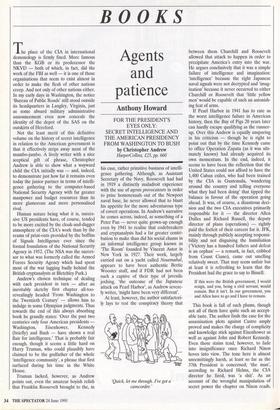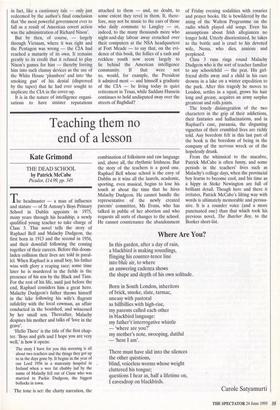BOOKS
Agents and patience
Anthony Howard
FOR THE PRESIDENT'S EYES ONLY: SECRET INTELLIGENCE AND THE AMERICAN PRESIDENCY FROM WASHINGTON TO BUSH by Christopher Andrew HarperCollins, £25, pp. 660 The place of the CIA in international demonology is firmly fixed. More famous than the KGB or its predecessor the NKVD — both of which, in fact, did the work of the FBI as well — it is one of those organisations that seem to exist almost in order to make the flesh of other nations creep. And not only of other nations either. In my early days in Washington, the notice `Bureau of Public Roads' still stood outside its headquarters in Langley, Virginia, just as some absurd military administrative announcement even now conceals the identity of the depot of the SAS on the outskirts of Hereford.
Not the least merit of this definitive volume on the history of secret intelligence in relation to the American government is that it effectively strips away most of the mumbo-jumbo. A lively writer with a nice sceptical gift of phrase, Christopher Andrew is able to show what a wayward child the CIA initially was — and, indeed, to demonstrate just how far it remains even today the junior partner in terms of intelli- gence gathering to the computer-based National Security Agency with far greater manpower and budget resources than its more glamorous and more personalised rival.
Human nature being what it is, succes- sive US presidents have, of course, tended to be more excited by the cloak-and-dagger atmosphere of the CIA's work than by the reams of print-outs provided by the boffins of Signals Intelligence ever since the formal foundation of the National Security Agency in 1952. (The NSA was the succes- sor to what was formerly called the Armed Forces Security Agency which had spent most of the war lagging badly behind the British cryptanalysts at Bletchley Park.)
Andrew's chosen technique of dealing with each president in turn — after an inevitably sketchy first chapter all-too- revealingly headed 'From Washington to the Twentieth Century' — allows him to indulge in some Olympian judgments. Thus towards the end of this always absorbing book he grandly states: 'Over the past two centuries only four American presidents Washington, Eisenhower, Kennedy (briefly) and Bush — have shown a real flair for intelligence.' That is probably fair enough, though it seems a little hard on Harry Truman, who could plausibly have claimed to be the godfather of the whole `intelligence community', a phrase that first surfaced during his time in the White House.
Truman lacked, however, as Andrew points out, even the amateur boyish relish that Franklin Roosevelt brought to the, in
his case, rather primitive business of intelli- gence gathering. Although, as Assistant Secretary of the Navy, Roosevelt had had in 1919 a distinctly maladroit experience with the use of agents provocateurs in order to prise homosexuals out of the Newport naval base, he never allowed that to blunt his appetite for the more adventurous type of covert operations. In Andrew's narrative he comes across, indeed, as something of a Peter Pan — never quite grown-up enough even by 1941 to realise that codebreakers and cryptanalysts had a far greater contri- bution to make than did his social chums in an informal intelligence group known as `The Room' founded by Vincent Astor in New York in 1927. Their work, largely carried out on a yacht called Nourmahal, appears to have been authentic Bertie Wooster stuff, and if FDR had not been such a captive of their type of juvenile joshing, 'the outcome of the Japanese attack on Pearl Harbor', as Andrew severe- ly writes, 'might have been very different'.
At least, however, the author satisfactori- ly lays to rest the conspiracy theory that `Quick, let me through. I've got a camcorder.' between them Churchill and Roosevelt allowed that attack to happen in order to precipitate America's entry into the war. He argues conclusively that it was a simple failure of intelligence and imagination: `intelligence' because the right Japanese naval signals were not decrypted and 'imag- ination' because it never occurred to either Churchill or Roosevelt that 'little yellow men' would be capable of such an astonish- ing feat of arms.
If Pearl Harbor in 1941 has to rate as the worst intelligence failure in American history, then the Bay of Pigs 20 years later can hardly escape qualifying as the runner- up. Over this Andrew is equally unsparing in his criticism — though he is right to point out that by the time Kennedy came to office Operation Zapata (as it was ulti- mately known) had already acquired its own momentum. In the end, indeed, it seems to have been the reflection that the United States could not afford to have the 1,400 Cuban exiles, who had been trained by the CIA in Guatemala, 'wandering around the country and telling everyone what they had been doing' that tipped the balance in favour of the operation going ahead. It was, of course, a disastrous deci- sion and the two CIA executives primarily responsible for it — the director Allen Dulles and Richard Russell, the deputy director of plans (operations) — rightly paid the forfeit of their careers for it. JFK, mainly through publicly accepting responsi- bility and not disguising the humiliation (`Victory has a hundred fathers and defeat is an orphan' — a remark, in fact, cribbed from Count Ciano), came out smelling relatively sweet. That may seem unfair but at least it is refreshing to learn that the President had the grace to say to Bissell:
If this were the British government, I would resign, and you, being a civil servant, would remain. But it isn't. In our government, you and Allen have to go and I have to remain.
This book is full of such plums, though not all of them have quite such an accept- able taste. The author finds the case for the assassination plots against Castro amply proved and makes the charge of complicity and knowledge stick against Eisenhower as well as against John and Robert Kennedy. Even those stains tend, however, to fade into insignificance once Richard Nixon hoves into view. The tone here is almost unremittingly harsh, at least so far as the 37th President is concerned; 'the man', according to Richard Helms, the CIA director he fired, was 'a shit'. As an account of the wrongful manipulation of secret power the chapter on Nixon reads, in fact, like a cautionary tale — only just redeemed by the author's final conclusion that 'the most powerful government ever to fall as a result of American covert action was the administration of Richard Nixon'.
But by then, of course, — largely through Vietnam, where it was right and the Pentagon was wrong — the CIA had reached a maturity of its own. It remains greatly to its credit that it refused to play Nixon's games for him — thereby forcing him into such clumsy devices as the use of the White House 'plumbers' and into 'the smoking gun' of his denial (disproved by the tapes) that he had ever sought to implicate the CIA in the cover-up.
It is in the nature of intelligence organi- sations to have sinister reputations attached to them — and, no doubt, to some extent they revel in them. It, there- fore, may not be music to the ears of those who daily commute to Langley — or, indeed, to the many thousands more who night-and-day labour away crouched over their computers at the NSA headquarters at Fort Meade — to say that, on the evi- dence of this book, the follies of a rash and reckless youth now seem largely to lie behind the American intelligence community. If that were not so, would, for example, the President it admired most — and himself a graduate of the CIA — be living today in quiet retirement in Texas, while Saddam Hussein continues to hold undisputed sway over the streets of Baghdad?



























































 Previous page
Previous page